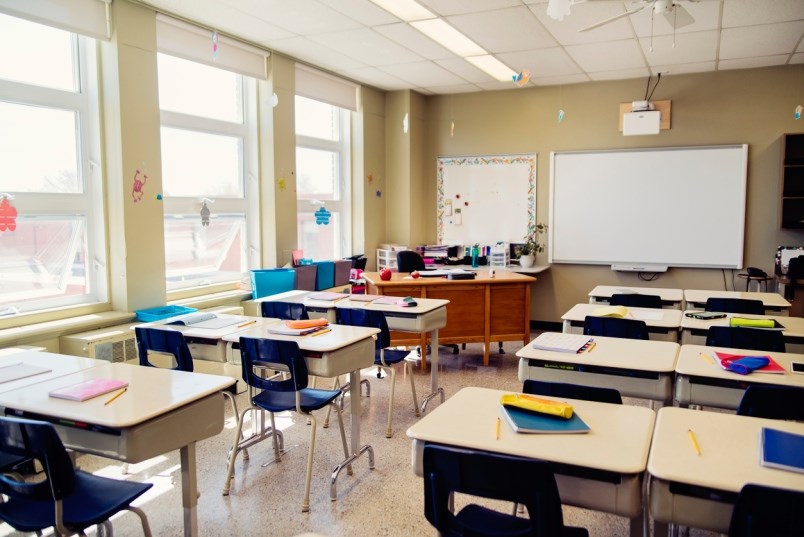Students on the North Shore will have the option of heading back to the classroom part-time starting in June, Education Minister Rob Fleming has announced.
But exactly what those classrooms look like and how they work could depend a lot on how many parents want to send their kids back into schools before the end of the school year.
The province announced Friday that parents can choose to send their kids back to school beginning June 1 but only on a part-time basis.
Children in kindergarten to Grade 5 will have the option of attending school approximately half-time, while older students in grades 6 to 12 will likely only be in school one day a week.
There’ll be fewer kids in classrooms at once, desks spaced a safe distance apart and staggered lunch and recess times.
Attending school in June will be voluntary. Parents can expect to hear next week about plans to restart school.
In West Vancouver, one of the first steps will be to survey parents, to find out how many of them want their kids to go back to the classroom, said superintendent Chris Kennedy.
“I think a lot of students would like the idea of some closure to the school year,” said Kennedy, adding that seems to be especially important both to the older high school students and the youngest primary children.
Kennedy said school officials will take the lessons they’ve already learned from having children of essential workers and particularly vulnerable students already attending to schools to plan for increasing the number of kids in the classrooms.
The essential worker school, at Hollyburn Elementary, has been “a good local example,” said Kennedy. “We're not going from fully closed schools to fully open schools. We're kind of just turning the dial, with increasing the number of students and adults who are in the buildings.”
Fleming said Friday there has been a range of responses from parents over the past two months to the shutdown of in-classroom lessons.
“I’ve certainly been hearing a number of different things from parents, depending on what their situation is,” he said.
“For many parents and guardians, this has meant trying to juggle work obligations while taking care of kids at home ... it hasn't been easy.”
Fleming said for most students, a return to school even part-time will likely be a positive move. “Kids learn better around their peers, they learn better when they can ask questions and receive direct attention from their teacher and support staff in a building,” he said.
Plans include frequent cleaning of classrooms and high-touch areas in schools as well as frequent hand washing for staff and students.
Guy Trotter, a parent in North Vancouver, said he’s greeting the news of the school reoening with some trepidation, and will wait to hear more details about how schools will be managing the classrooms before deciding whether to send his son to school.
During the regular school year, his son was in a portable classroom at Ross Road Elementary, said Trotter, with no ready access to sinks and bathrooms.
The biggest reason to go back to school would be to renew his son’s social connections with friends and his teacher, said Trotter.
“We’re feeling our way along at this point,” he said.
Other parents had similar concerns.
Mohamed Hussein said he’s not likely to send his son - who goes to Grade 4 in West Vancouver and has a health condition - back to school in June.
“It’s not going to be even a month,” he said. “We’ve already developed a routine here and so we don’t want to disrupt it.”
Michelle Le, whose son goes to Grade 10 at Handsworth, had similar thoughts.
“I think it’s a little bit too rushed,” she said. “B.C. is doing pretty well but we still have people with the virus.”
Students have just got used to their new routines and doing back to school would mean adjusting again, just for one day a week in school, she said.
Fleming said Friday that online learning will continue for students who choose not to go back to classrooms.
But that also leaves a lot of questions for teachers, said Renee Willock, president of the West Vancouver Teachers Association, who said it would be difficult for teachers to do both at the same time.
“There’s a lot of questions about what this is going to look like,” she said. “The logistics around it are very complicated.”
Teachers who have young children themselves are also wondering about daycare for their own kids if they are expected back in the classrooms, she added.
On Friday, Premier John Horgan said the return to school would be gradual. “This is not the flick of a switch,” he said. “The plan will be gradual, and it'll be based on scientific recommendations ... we would not be making these announcements today if we felt there was an undue risk to the health and well-being of the youngsters that are going into our schools.”
Dr. Bonnie Henry, the province’s medical health officer, has said there appears to be a low risk of children becoming ill from COVID-19, compared to adults.
Fleming said B.C. school officials are also keeping a close eye on what’s happening in other countries that have reopened their schools, including Denmark and New Zealand.



